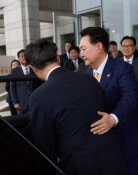Opposite results in the global competitiveness report
Opposite results in the global competitiveness report
Posted October. 18, 2018 07:32,
Updated October. 18, 2018 07:32
Korea ranked 15th out of 140 countries in the Global Competitiveness Report released Tuesday by the World Economic Forum (WEF). This is a huge progress considering that the country stood at 26th for fourth straight year until 2017. This was due in part to the revised evaluation system that takes into account new trends, such as the fourth industrial revolution and global financial crisis. According to the new evaluation scheme, Korea’s ranking last year rises to 17th place, meaning that the country’s global competitiveness this year climbed two notches from a year earlier.
It is encouraging that Korea is assessed to be the world’s 15th most competitive country in the new economic environment. Korea topped the chart in the categories, such as information and communication technology (ICT) adoption and online administration service. The WEF viewed Korea as a major innovation hub on the basis of country’s high number of patent applications and spending on R&D. Korea boasted a world-class macroeconomic stability, including fiscal and public financial transparency, meaning that the country has relatively strong fundamentals.
The report, however, found that Korea was among the least competitive countries in the world in terms of labor market efficiency. Korea ranked 134th in labor-management cooperation and 114th in layoff cost, showing vulnerability in the labor market again this year. The report yet again pointed out that Korea lacked efficiency in the labor market. The U.S. and Singapore, which stood at 1st and 2nd, respectively, in the overall global competitiveness index this year, came in at 1st and 3rd, respectively, in terms of labor market efficiency. This suggests that the labor market plays an important part of national competitiveness.
It is hard to understand why Korea is lagging behind in labor market efficiency aside from belligerent labor unions represented by the Korean Confederation of Trade Unions. Alternative workforce is banned in Korea. There is nothing businesses can do once labor unions call a strike. After the Moon Jae-in administration took office, the government gave in to labor unions and scrapped the “two major guidelines” on dismissal of underperforming employees and rules of employment, further stiffening the labor market. Reduced flexibility in the labor market is making it hard for businesses to increase employment despite the introduction of the new maximum working hours.
“Whether a country reaches a grand social compromise determines the future course of the country,” said Democratic Party of Korea leader Lee Hae-chan Tuesday. Concession by the establishment is a prerequisite for a grand social compromise. If the ruling party is truly willing to reach a grand social compromise, it should persuade union leaders, now the establishment of our society, to narrow the differences with the management. Global competitiveness cannot be improved without a labor reform.







